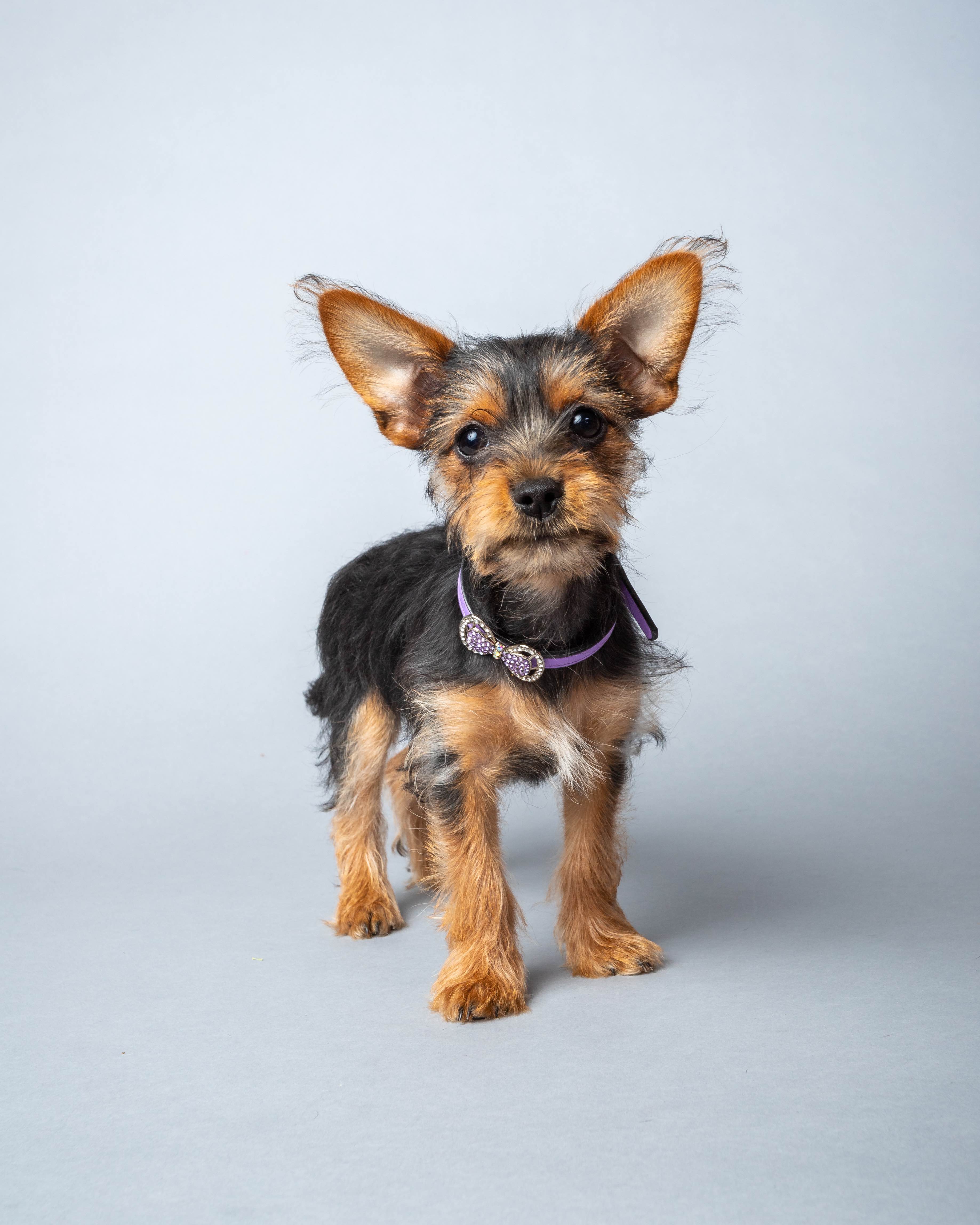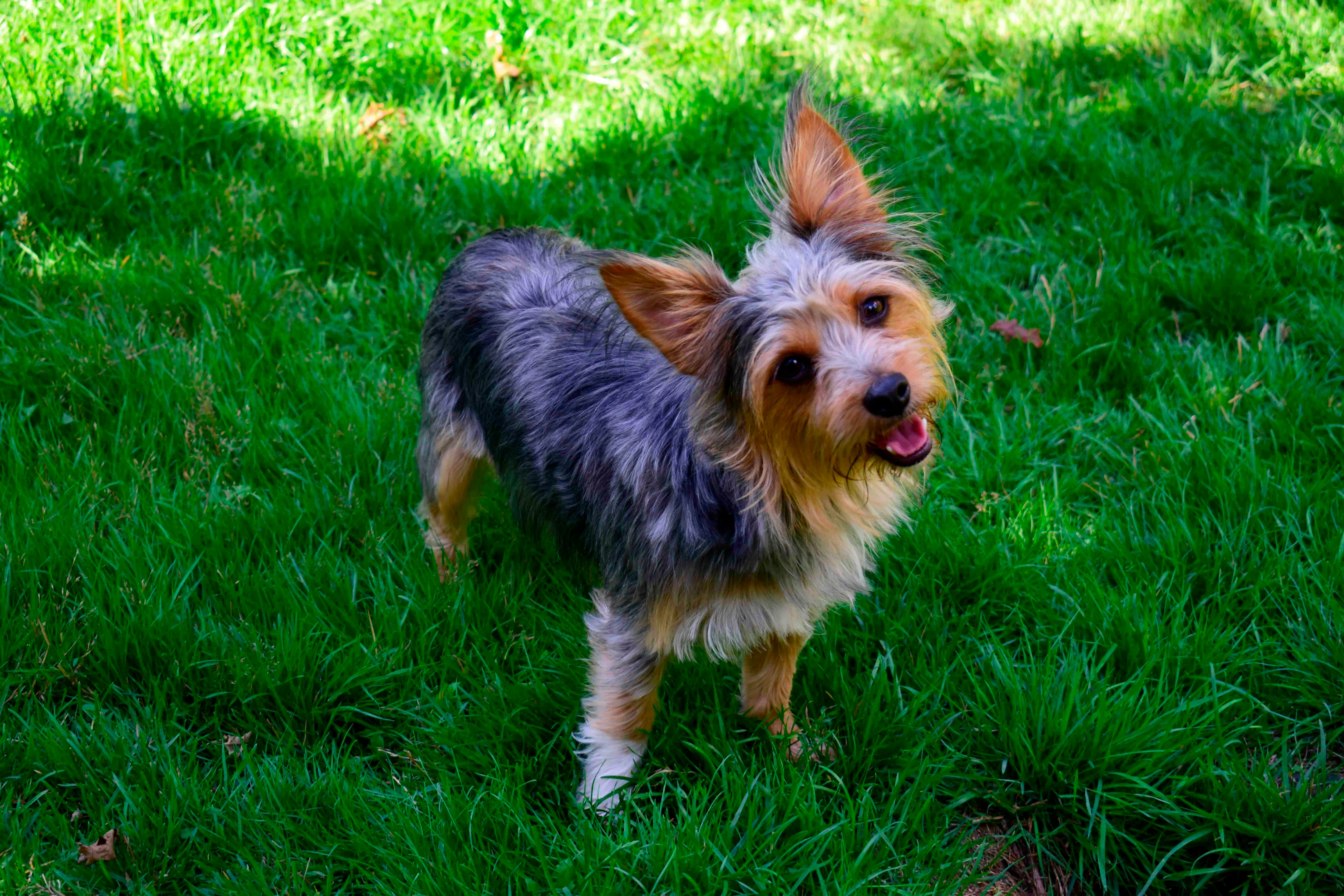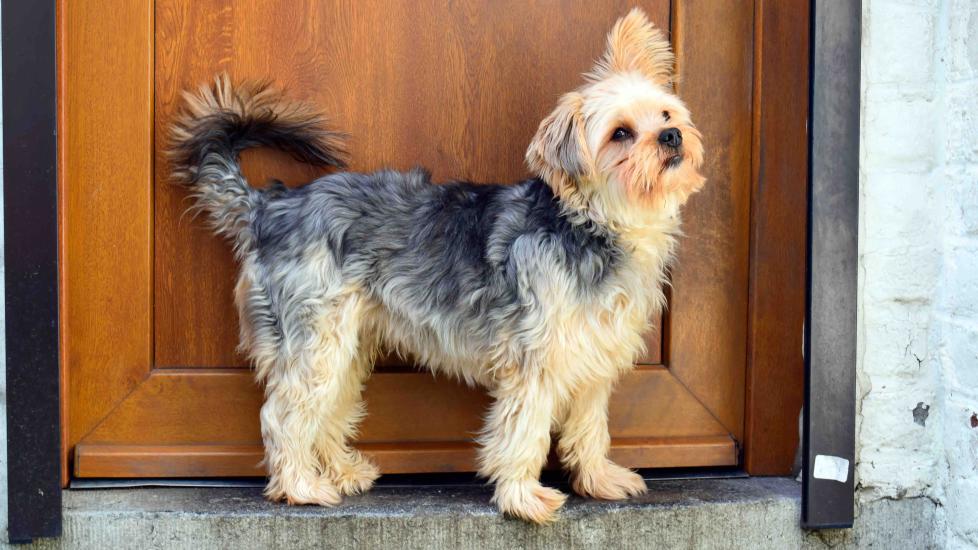Chorkie
Adobe Stock/mali
The Chorkie dog is a cross between a Chihuahua and a Yorkshire Terrier (Yorkie). Sometimes called a Yorkiechi or Chiyorkie, the Chorkie is a relatively new mix and is not yet recognized as an official breed by the American Kennel Club (AKC).
Because the Chorkie is so new to the dog world, they are highly variable in both temperament and appearance. But we can look to both long-established parent breeds to understand a Chorkie’s potential characteristics.
Both Chihuahuas and Yorkies are pint-sized dogs, standing under 10 inches tall and weighing less than 10 pounds. When these two popular breeds combine to create a Chihuahua-Yorkie mix, you can typically expect a teeny dog with a tenacious, terrier-like personality that’s perfect for lap lounging and apartment living.
Caring for a Chorkie
Both of the Chorkie’s parent breeds can be described as ideal city companions. Their compact size means they need very little space to thrive—even their moderate exercise requirements can be met with indoor games. However, early socialization and consistent positive training are necessary to help temper the Chorkie’s alert tendencies and wariness of strangers. Otherwise, their talent for barking may make you an unpopular neighbor.
Though highly adaptable and affectionate, a Yorkie-Chihuahua mix may not be the best choice for a home with very young children or very large dogs, as their toylike size makes them vulnerable to accidental injuries.
The Chorkie’s grooming needs are a bit difficult to pin down, depending on which parent they favor. Yorkies are at the top of the grooming scale, with humanlike hair that needs a daily brush and regular baths. Chihuahuas, on the other hand, can have either long or short fur, and can suffice with a weekly brush and occasional bathing.
Chorkie Health Issues

Both Chihuahuas and Yorkshire Terriers are healthy breeds with life expectancies of 14–16 years and 11–15 years, respectively, so the Chorkie’s lifespan falls within these ranges. Still, like all dogs, the two breeds are prone to various health conditions that can be passed to their Chorkie puppies. This highlights the importance of working with a Chorkie breeder who’s committed to health over profit and performs genetic testing before breeding.
Patellar Luxation
When the patella (kneecap) moves outside its normal groove within the femur (thigh bone), this is called patellar luxation (dislocation). The condition is more common in smaller breeds such as Chihuahuas and Yorkies. It doesn’t cause a problem in some dogs, but severe cases may require surgery.
Signs of patellar luxation include:
-
Limping
-
Bunny-hopping
-
Popping, cracking knee joint
Patent Ductus Arteriosus
Patent ductus arteriosus (PDA) is a common congenital heart defect in dogs, and both of the Chorkie’s parent breeds are at an increased risk.
The ductus arteriosus is a blood vessel that’s necessary during fetal development to divert blood away from the fetus’ lungs. Shortly after birth, this vessel naturally closes to allow blood to flow through the lungs for oxygenation. But in Chorkie puppies with PDA, the ductus arteriosus stays open, resulting in a dangerous disruption of normal circulation. This can lead to heart failure.
Treatment requires corrective surgery to close the vessel, and outcomes are best if it’s done before the dog develops congestive heart failure (CHF). If surgery is done early (before CHF occurs) the dog may be cured.
Periodontal Disease
Periodontal disease, or gum disease, is a progressive condition in which bacteria accumulate in the mouth, causing damage to the dog’s gums, jaw bones, and other tissues. While the disease is common in all dogs, small and toy breeds are especially prone to the problem.
Signs of periodontal disease range from irritated gums and bad breath to missing teeth and root exposure. Mild cases may only need a professional dental cleaning, while severely affected teeth must be extracted.
Frequent tooth brushing at home (at least three times a week) and regular professional cleanings are the best way to prevent periodontal disease.
Tracheal Collapse
The trachea (windpipe) is a tube of cartilage and membrane that carries air from the mouth and nose to the lungs. If the cartilage weakens or the membrane stretches out, the trachea’s shape flattens. This is called tracheal collapse, and both Chihuahuas and Yorkshire Terriers carry an increased risk of developing this condition.
Dogs with tracheal collapse tend to have a recurring cough that sounds like a goose honk and tends to worsen with exercise, heat and humidity, excitement, stress, and eating and drinking. Medication is typically enough to help most dogs with tracheal collapse if they have clinical signs, but some may require surgery. If the symptoms are not persistent or severe, treatment might not be necessary.
What To Feed a Chorkie
There’s no all-encompassing recommendation for feeding your Chorkie dog. You’ll need to work with your veterinarian to develop a feeding plan that’s nutritionally complete and balanced for your pup’s age, weight, and health. Even the size of the kibble is important; Chorkies have tiny teeth that require small kibble.
How To Feed a Chorkie
Chorkie puppies need frequent meals (three or four a day) to avoid hypoglycemia (low blood sugar). Full-grown Chorkies can be fed less frequently—typically two or three times a day. Your vet can help you determine the best schedule for your dog’s age.
How Much Should You Feed a Chorkie?
The nutrition label on your dog’s food bag includes a feeding guide that gives a general idea of how much you should feed your Chorkie based on their weight. But for a better recommendation tailored to your specific dog, ask your veterinarian. The right amount of food depends on your pup’s weight, body condition score, lifestyle, and health needs.
The Chorkie can be prone to obesity, so remember to factor treats into their daily calorie requirements. Treats should never make up more than 10% of your dog’s diet.
Nutritional Tips for Chorkies
If your Chorkie is eating a complete and balanced diet of dog food approved by the Association of American Feed Control Officials (AAFCO), they’ll receive all the nutrition they need. However, your veterinarian may recommend nutritional supplements or even a prescription diet, depending on your dog.
Given the parent breeds’ predisposition for periodontal disease, your vet may recommend dental chews as a precaution for your Chorkie (though chews won’t replace regular tooth brushing)!
Talk to your veterinary team before adding anything new to your dog’s diet.
Behavior and Training Tips for Chorkies
Chorkie Personality and Temperament

Both the Chihuahua and the Yorkie are described as having a classic terrier-like temperament, so you can expect your Chorkie to have a lot of sass and spunk. But despite their confidence, they still crave companionship and are loyal, affectionate pets.
Though Chorkies are quite high in energy, their tiny stature makes getting exercise a breeze. Short walks and indoor games of fetch can fulfill their mental and physical requirements. And while their small size makes them adaptable to a wide range of environments, including urban apartments, it also creates vulnerability—particularly when in the company of very young children or very large dogs that might accidentally hurt an animal so small.
Chorkie Behavior
Despite their diminutive stature, both Chihuahuas and Yorkies can have watchdog instincts. They will need help curbing their wariness of strangers (and the nonstop barking that can accompany this unease).
Chorkies are not fans of being left alone for long periods. Bored, lonely Chorkies with energy to spare are more likely to engage in unwanted behaviors like barking and chewing.
Chorkie Training
It’s important to safely expose your Chorkie puppy to various animals, people, environments, activities, and objects during their first 16 weeks of life. This is a crucial learning period, and socializing your puppy can help them feel comfortable in a wide variety of settings. This is especially important for dogs with "stranger danger” instincts. Ask your veterinarian to share age-appropriate socialization activities.
Chorkies are smart, loving, and often eager to please, but their terrier temperament (like a strong will) requires consistent training. A positive, rewards-based approach has the triple benefit of teaching necessary skills, building the human-animal bond, and providing mental and physical exercise.
If you use treats as a reward during training, factor them into your dog’s daily calorie count. Play, dog toys, and other things your Chorkie enjoys can also be used as rewards—not just treats.
Fun Activities for Chorkies
-
Short walks
-
Puzzles
-
Obedience training
-
Skills training
-
Fetch
Chorkie Grooming Guide
Whether your Chorkie is low- or high-maintenance when it comes to grooming depends on which parent they favor. The Yorkie’s fine, silky hair needs daily attention, but the Chihuahua’s coat is significantly easier to manage. Regardless of fur length, Chorkie shedding levels are fairly minimal.
Skin Care
Good coat care is the foundation of good skin care. Tangles and matting can keep moisture, debris, and other irritants next to your Chorkie’s skin, so it’s essential to keep their hair free from problems.
Chorkies need regular baths, so ask your veterinarian for help when determining a schedule. Keep in mind that bathing your pup too often can strip their skin of healthy oils, causing dryness and itchiness.
Coat Care
Long-haired Chorkies should be brushed every day to prevent tangles or mats from forming. But if caring for long locks feels a bit too daunting, you can give your pup a short haircut that’s easier to manage.
Just keep in mind that they may need a bit of help staying warm in cold temperatures, providing the perfect reason to invest in a cute, cozy sweater.
Eye Care
The Chorkie’s Chihuahua parent can be prone to eye issues including glaucoma, chronic dry eye, and cataracts. Schedule a vet appointment if you notice signs of disease, like bulging eyes, redness, or discharge.
Regardless of how long you keep your Chorkie’s coat, you’ll need to regularly trim the hair around their eyes so it doesn’t cause irritation.
Ear Care
Ask your veterinarian for tips on how (and how often) to safely clean your Chorkie’s ears. Always use a veterinary-recommended ear cleaner. If you notice signs of an ear infection (redness, swelling, pain, or bad odor), it’s time to make a vet appointment.
Considerations for Pet Parents
Here are some questions to consider before adding a Chorkie puppy to your family:
-
Can I provide a safe environment for a tiny dog?
-
Can I brush a dog’s coat once a day, if needed?
-
Can I brush a dog’s teeth at least three times a week?
-
Am I home enough to give a dog companionship?
-
Do I have the time to provide a dog with mental and physical exercise every day?
-
Do I have the skills and patience to train a dog, using positive reinforcement?
-
Am I financially prepared to provide veterinary care?
-
Can I provide a dog with a loving home for their lifetime, which could be 16 years or more?
If you can answer these questions with an enthusiastic “Yes!” you may be ready to parent a Chorkie.
Chorkie FAQs
Is a Chorkie a good dog?
Chorkies can be a great dog for a wide range of families, as they require little space for life and exercise and are a playful combination of sweetness and spunk. However, they may not be the best choice for families with very small children or large pets, as their tiny size makes them vulnerable to accidental injuries.
How big does a Chorkie get?
Full-grown Chorkies won’t get much bigger than 8 inches tall, and they’ll typically weigh about 7 pounds.
Can Chorkies be left alone?
Chorkies can be left alone—but not for long. They desire to be close to their human family members and can exhibit unwanted behaviors like barking when left to their own devices for extended periods.
